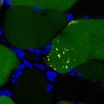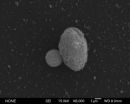(Press-News.org) JILA researchers have engineered a short, flexible, reusable probe for the atomic force microscope (AFM) that enables state-of-the-art precision and stability in picoscale force measurements. Shorter, softer and more agile than standard and recently enhanced AFM probes, the JILA tips will benefit nanotechnology and studies of folding and stretching in biomolecules such as proteins and DNA.
An AFM probe is a cantilever, shaped like a tiny diving board with a small, atomic-scale point on the free end. To measure forces at the molecular scale in a liquid, the probe attaches its tip to a molecule such as a protein and pulls; the resulting deflection of the cantilever is measured. The forces are in the realm of piconewtons, or trillionths of a newton. One newton is roughly the weight of a small apple.
The new probe design, described in ACS Nano,* is the JILA research group's third recent advance in AFM technology. JILA is jointly operated by the National Institute of Standards and Technology (NIST) and University of Colorado Boulder.
The group previously improved AFM position stability by using laser beams to sense motion** and removing the gold coating from long probe tips, or cantilevers, to enhance long-term force stability.*** However, removing the gold reduces the strength of the signal being measured, and using long cantilevers leads to other measurement problems such as slower response to dynamic events like protein unfolding.
The latest modification overcomes these and other issues, improving precision without loss of stability, speed, or sensitivity. JILA researchers used a focused ion beam to cut a hole in the center of a short commercial cantilever and thinned the remaining support structures, thereby reducing the cantilever's stiffness and friction near surfaces. The result is excellent long-term stability and improved short-term precision, respectively, in AFM force measurements.
JILA researchers also added a protective glass cap over the gold coating at the end of the cantilever to retain beneficial reflectivity, and then removed the remaining gold to gain force stability. The modified cantilever enables rapid, precise and stable force measurements across a broad range of operating frequencies.
"Previously, we had to average the Brownian (random) motion of our favorite cantilever for about 60 milliseconds to get a measurement that had a precision of 1 piconewton," JILA/NIST biophysicist Tom Perkins says. "Now, we can get the same precision in 1 millisecond or so."
JILA researchers demonstrated significant benefits for single molecule studies. For instance, the short, soft cantilevers can quickly measure abrupt changes in force when a protein unfolds. Protein folding is required for proper biological function and misfolding can lead to diseases such as Alzheimer's. The new cantilevers match the response of stiffer, unmodified cantilevers but with greater stability and precision. Force stability is crucial in this application because protein folding and unfolding rates are exponentially sensitive to tiny changes (smaller than 1 piconewton) in applied load. The new device also can track fleeting nanoscale events, including protein folding, over hundreds of seconds—much longer periods than previously possible. The new design should also be applicable to rapid probing of the mechanical properties of materials at the nanoscale.
Significantly, the new cantilevers are robust enough to be reused for multiple days. Moreover, JILA researchers say the new design is simple and inexpensive to make, and thus, suitable for routine use.
"Amazingly, this project was spearheaded by a talented undergraduate. We hope other groups with similarly talented students will adopt these cantilevers. We certainly are," Perkins said.
INFORMATION:
The research was supported by the National Science Foundation and NIST.
*M.S. Bull, R.M.A. Sullan, H. Li and T.T. Perkins. Improved single-molecule force spectroscopy using micromachined cantilevers. ACS Nano. Published online March 26,2014. DOI:10.1021/nn5010588
**See 2009 NIST Tech Beat article, "Making a Point: Picoscale Stability in a Room-Temperature AFM," at http://www.nist.gov/public_affairs/tech-beat/tb20090324.cfm#afm.
***See 2012 NIST Tech Beat article "Not-So-Precious: Stripping Gold From AFM Probes Allows Better Measurement of Picoscale Forces,"at http://www.nist.gov/pml/div689/afm-062712.cfm.
No compromises: JILA's short, flexible, reusable AFM probe
2014-04-09
ELSE PRESS RELEASES FROM THIS DATE:
Green is good
2014-04-09
As unlikely as it sounds, green tomatoes may hold the answer to bigger, stronger muscles.
Using a screening method that previously identified a compound in apple peel as a muscle-boosting agent, a team of University of Iowa scientists has now discovered that tomatidine, a compound from green tomatoes, is even more potent for building muscle and protecting against muscle atrophy.
Muscle atrophy, or wasting, is caused by aging and a variety of illnesses and injuries, including cancer, heart failure, and orthopedic injuries, to name a few. It makes people weak and fatigued, ...
The surgical treatment of bilateral benign nodular goiter
2014-04-09
About 100.000 thyroid operations are performed in Germany each year, a large percentage of them for the treatment of benign thyroid disease (euthyroid nodular goiter). In the current issue of Deutsches Ärzteblatt International (Dtsch Arztebl Int 2014; 111 (10): 161-8), Nada Rayes and colleagues suggest a paradigm shift in the treatment of such lesions. The article is accompanied by an editorial by Roland Gärtner.
Radical surgery has become much more common in the past few years and has been motivated by a desire to prevent recurrences. From 2006 to 2008, the percentage ...
One of the last strongholds for Western chimpanzees
2014-04-09
This news release is available in German. When Liberia enters the news it is usually in the context of civil war, economic crisis, poverty or a disease outbreak such as the recent emergence of Ebola in West Africa. Liberia's status as a biodiversity hotspot and the fact that it is home to some of the last viable and threatened wildlife populations in West Africa has received little media attention in the past. This is partly because the many years of violent conflict in Liberia, from 1989 to 1997 and from 2002 to 2003, thwarted efforts of biologists to conduct biological ...
The Lancet: Small cash incentives dramatically improve hepatitis B vaccination rates among injecting drug users
2014-04-09
Small financial incentives, totalling as little as £30, can dramatically increase the likelihood of people who inject drugs completing a course of hepatitis B virus (HBV) vaccination, according to new research published in The Lancet.
Researchers in the UK found that people undergoing treatment for heroin addiction who received a maximum total of £30 supermarket vouchers in equal or graduated instalments in return for full compliance with a regimen of three HBV vaccine injections were at least 12 times as likely to complete the course within 28 days compared to those ...
Processing new information during sleep compromises memory
2014-04-09
Washington, DC — New research appearing in the April 9 issue of the Journal of Neuroscience highlights the important role sleep plays in strengthening and maintaining the accuracy of a memory and hints at why the brain shuts out sensory information during periods of deep sleep. The study found that introducing new odor information to an animal while it sleeps compromises its ability to remember the difference between new and previously encountered smells while awake.
During sleep, the brain performs a number of important repair and maintenance duties that are necessary ...
Language structure ... you're born with it
2014-04-09
Humans are unique in their ability to acquire language. But how? A new study published in the Proceeding of the National Academy of Sciences shows that we are in fact born with the basic fundamental knowledge of language, thus shedding light on the age-old linguistic "nature vs. nurture" debate.
THE STUDY
While languages differ from each other in many ways, certain aspects appear to be shared across languages. These aspects might stem from linguistic principles that are active in all human brains. A natural question then arises: are infants born with knowledge of how ...
Lead continues to be a serious threat to California condor populations
2014-04-09
The California condor was one of the first species to be listed under the Endangered Species Preservation Act in 1966 when the population was reduced to a handful of birds. Through a massive collaborative effort that included fieldwork and breeding in zoos, the condor population has grown to more than 400 birds, more than half of which are now free-flying in the wild. Unfortunately, there is overwhelming evidence that lead poisoning from accidental ingestion of spent ammunition is the leading cause of death in the wild population, and this may prevent the establishment ...
Identified a new possible target to combat muscle wasting
2014-04-09
In the study published today in the Journal of Clinical Investigation (JCI), one of the journals with highest impact in experimental medicine, the researchers associate the activity of the DOR protein with muscle atrophy and point to DOR as a plausible target against which to develop a drug to prevent muscle deterioration in certain diseases.
DOR (Diabetes- and Obesity-regulated gene), also known as TP53INP2, is a protein involved in autophagy, a quality control process that ensures cells stay healthy. The researchers have found that increased DOR expression in the muscle ...
UNC researchers show how cancer cells may respond to mechanical force
2014-04-09
April 9, 2014 The push and pull of physical force can cause profound changes in the behavior of a cell. Two studies from researchers working at the UNC Lineberger Comprehensive Cancer Center reveal how cells respond to mechanical manipulation, a key factor in addressing the underlying causes of cancer and other diseases.
The studies, published in Nature Cell Biology and the Journal of Immunology, have their roots in a longtime partnership between the labs of Keith Burridge, PhD, Kenan Professor of Cell Biology and Physiology in the UNC School of Medicine, and Richard ...
Study examines mental health toll exacted on civilians working with military in war zones
2014-04-09
WASHINGTON, DC, April 9, 2014 — The punishing psychological toll endured by military personnel in war zones has been extensively documented for years by researchers, perhaps more than ever in the wake of recent military engagements in Iraq and Afghanistan.
But there has been a troubling dearth of research examining the mental health toll exacted on the large numbers of civilians who work with the military in war zones.
Sociologists Alex Bierman, an assistant professor at the University of Calgary, and Ryan Kelty, an associate professor at Washington College in Maryland, ...



